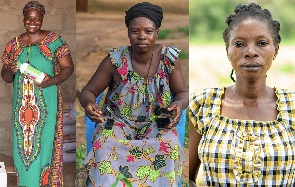Sunday, October 15, 2023, was International Day of Rural Women. The United Nations celebrates the day annually to honour women who live in remote and rural places. The day is also used to acknowledge these women for their achievements and contributions to rural development and food security.
Women are at the heart of Africa’s food sector, responsible for the production, processing, marketing, and distribution of food. Without them, there is no food system. They are involved not only in the production of food, but also in the processing, preparing, and marketing of produce.
As we mark the day, we at AGRA want to celebrate 3 amazing women who are doing extraordinary things to help improve agriculture in the Upper West Region, and Ghana’s food security at large.
First, Rafatu Ahmed is an agro dealer at Sakai in the Sissala West District.
She runs the Wianipakia Enterprise, which translates as “God is giving wealth” Enterprise. True to the meaning of the small agribusiness firm she leads, Rafatu provides farmers in the vicinity with inputs on credit that they pay for with their produce at the end of the farming season.
“We help farmers with inputs. Chemicals and certified seeds. I give the input to farmers. At the end of the season, they come and recover it with maize,” she explained. “I help about 100 women every season,” she added.
She says training from the Africa Fertilizer and Agribusiness Partnership (AFAP) and AGRA has helped her disseminate knowledge on the appropriate use of pesticides to the farmers she works with.
“AFAP trained me. I also come and train my farmers on how to apply fertiliser on their farms. AFAP trains us in business. They send us to demo fields. And they train us on how to run your business", she said.
Rafatu has big plans for her business going into the future. “In the future, I wish to expand it so that I can be able to help a lot of women… More women need support but I don’t have… I want help so that we can do more,” she said.
Mariam Issahaku, a farmer, and community-based agent at Chaangu in the Nadowli–Kaleo District is another woman who is making a great impact on food security efforts in the region.
She cultivates 3 acres of maize, 5 acres of groundnut, and 2 acres of soybean every season, and additionally rears poultry. A mother of 6, she works with AGRA and other organisations to disseminate knowledge on good agricultural practices to farmers.
“During the farming season, I always organise the farmers and advise them not to just pick seeds and cultivate. They should always look for certified seeds. Also, they should plan the farming. And get the seeds, fertiliser, and certified seeds before farming,” Mariam explained.
“I also advise them on spraying, I advise them to put on protective clothing and protect themselves so the toxins don’t enter their body,” she added.
The third woman we celebrate is an agricultural extension agent at Funsi in the Wa East District, Vida Alzumah.
She supports hundreds of female and male farmers in her community and beyond with knowledge and insights so they can improve their productivity.
“We supervise farmers and also take them through agronomic practices. Which will increase food security in Ghana. Agronomic practices like the time for planting and planting distance, farm sanitation, fertiliser application, post-harvest management, etc,” she explained.
She supervises the establishment of demonstration farms in communities from which farmers can learn good agronomic practices.
With Ghana’s low extension agent-to-farmer ratio, the work that Vida and Mariam do is important to ensure farmers have the appropriate knowledge to modernise their production activities.
In a country where agricultural financing is a big deal and farmer access to credit inputs is minimal, the work that Rafatu does is important to ensure farmers don’t go out of business. We commend them for all their good work.
As AGRA President Dr. Agnes Kalibata once said, “Now is a unique moment to collectively aim for economic, social, and environmental transformation on a previously unthinkable scale. Women can lay the foundation and lead the effort to build back better – we just have to give them the chance.”
Let’s all keep investing in women like these and others. With more than 80% of food on the African continent being produced by women, investments in these women have the potential to generate vast returns which will make Africa and Ghana food secure.
I will round up this appreciation article by briefly touching on the theme for this year’s celebration, “Rural women confront the global cost-of-living crisis.”
The theme couldn’t have been more appropriate. Across the world, the continuous rippling effects of the Covid-19 pandemic, climate change, and conflicts like the Russia – Ukraine war, are causing the cost of agricultural inputs and food prices to spiral out of control.
As the Africa Agriculture Status 2023 observes, the Russia - Ukraine war has disrupted global energy and food markets resulting in a surge in prices of agricultural inputs, energy, and food. The impact of these disruptions on the global supply of agricultural inputs like fertilizer has been greatly felt by sub-Saharan African countries that source some of their fertiliser supplies from Russia, Belarus, and Ukraine. Prices of Nitrogen fertilisers have surged to well over USD 1,000 from roughly USD 500–550 in 2021.
The women farmers and agro-dealers we spoke to confirmed this. “As of 2018, 2019, fertiliser was sold at 150 Cedis for a bag. But these days, it’s up to 500 Cedis. The high prices affect the women because they don’t have the funds to buy the fertilizer,” Rafatu observed.
Governments and non-government actors across Africa need to take concrete actions to help ensure women and farmers, in general, can access inputs at a less expensive cost to invest in agriculture. This is a sure way to combat the food price hike crisis.
Opinions of Saturday, 21 October 2023
Columnist: Regina Richardson















